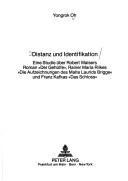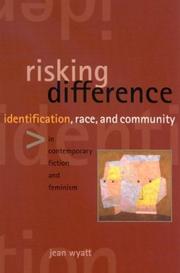| Listing 1 - 4 of 4 |
Sort by
|

ISBN: 3820400214 Year: 1987 Publisher: Frankfurt am Main Lang
Abstract | Keywords | Export | Availability | Bookmark
 Loading...
Loading...Choose an application
- Reference Manager
- EndNote
- RefWorks (Direct export to RefWorks)
Book
ISBN: 1108857264 1108866298 1108853471 1108496164 Year: 2021 Publisher: Cambridge, United Kingdom : Cambridge University Press,
Abstract | Keywords | Export | Availability | Bookmark
 Loading...
Loading...Choose an application
- Reference Manager
- EndNote
- RefWorks (Direct export to RefWorks)
In the nineteenth century, no assumption about female reading generated more ambivalence than the supposedly feminine facility for identifying with fictional characters. The belief that women were more impressionable than men inspired a continuous stream of anxious rhetoric about "female quixotes": women who would imitate inappropriate characters or apply incongruous frames of reference from literature to their own lives. While the overt cultural discourse portrayed female literary identification as passive and delusional, Palacios Knox reveals increasing accounts of Victorian women wielding literary identification as a deliberate strategy. Wayward women readers challenged dominant assumptions about "feminine reading" and, by extension, femininity itself. Victorian Women and Wayward Reading contextualizes crises about female identification as reactions to decisive changes in the legal, political, educational, and professional status of women over the course of the nineteenth century: changes that wayward reading helped women first to imagine and then to enact.
Women --- English fiction --- Women and literature --- Books and reading in literature. --- Identification (Psychology) in literature. --- Women in literature. --- Woman (Christian theology) in literature --- Women in drama --- Women in poetry --- Books and reading --- History --- History and criticism.
Book
ISBN: 0814270328 0814211992 0814256392 Year: 2012 Publisher: Columbus : Ohio State University Press,
Abstract | Keywords | Export | Availability | Bookmark
 Loading...
Loading...Choose an application
- Reference Manager
- EndNote
- RefWorks (Direct export to RefWorks)
Identification (Psychology) in literature. --- Bildungsromans --- Fiction --- History and criticism. --- Women authors --- Winterson, Jeanette, --- Hall, Radclyffe --- Woolf, Virginia, --- Kincaid, Jamaica --- Dangarembga, Tsitsi --- Beauvoir, Simone de, --- Eliot, George, --- Brontë, Charlotte, --- Criticism and interpretation. --- Bildungsroman

ISBN: 0791484882 142373968X 9781423739685 0791461289 9780791461280 0791461270 9780791461273 9780791484883 9780791484883 Year: 2004 Publisher: Albany State University of New York Press
Abstract | Keywords | Export | Availability | Bookmark
 Loading...
Loading...Choose an application
- Reference Manager
- EndNote
- RefWorks (Direct export to RefWorks)
Risking Difference revisions the dynamics of multicultural feminist community by exploring the ways that identification creates misrecognitions and misunderstandings between individuals and within communities. Drawing on Lacanian psychoanalysis, Jean Wyatt argues not only that individual psychic processes of identification influence social dynamics, but also that social discourses of race, class, and culture shape individual identifications. In addition to examining fictional narratives by Margaret Atwood, Angela Carter, Sandra Cisneros, Toni Morrison, and others, Wyatt also looks at nonfictional accounts of cross-race relations by white feminists and feminists of color.
Race in literature. --- Community in literature. --- Group identity in literature. --- Multiculturalism in literature. --- Identification (Psychology) in literature. --- Psychoanalysis and culture --- Psychoanalysis and feminism --- African American women --- American fiction --- Women and literature --- Feminism and literature --- Culture and psychoanalysis --- Culture --- Feminism and psychoanalysis --- Feminism --- Afro-American women --- Women, African American --- Women, Negro --- Women --- Community in literature --- Intellectual life. --- African American authors --- History and criticism. --- History --- Women authors --- Communities in literature.
| Listing 1 - 4 of 4 |
Sort by
|

 Search
Search Feedback
Feedback About UniCat
About UniCat  Help
Help News
News